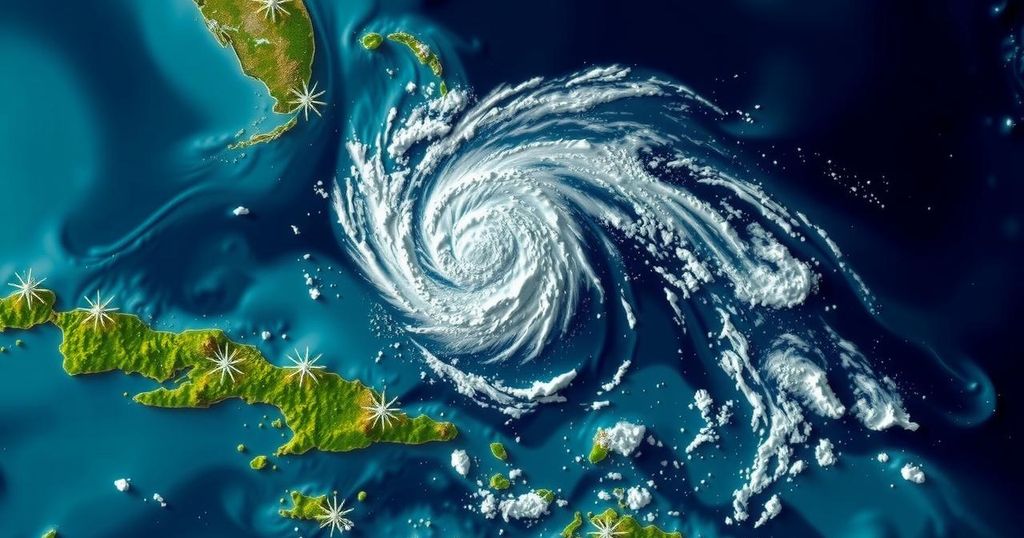Tropical Storm Oscar Approaches the Bahamas After Impacting Cuba
Tropical Storm Oscar is moving towards the Bahamas after affecting Cuba as a Category 1 hurricane, causing at least six fatalities and severe rainfall. With forecasts warning of further rain and the storm being the smallest hurricane recorded, urgency remains high in protective measures within impacted regions. Meanwhile, Tropical Storm Kristy is also active in the Pacific, expected to intensify.
Tropical Storm Oscar is currently advancing towards the Bahamas following its landfall in Cuba as a Category 1 hurricane, resulting in the tragic deaths of at least six individuals alongside significant rainfall across the region, which has exacerbated existing power outages. As of Tuesday morning, the storm was located roughly 45 miles south-southeast of Long Island, Bahamas. It exhibited sustained winds of 40 mph, progressing at a speed of 12 mph towards the north-northeast, according to the National Hurricane Center in Miami, which noted, “Oscar is at best barely a tropical storm at this time.” Prognostications suggest that the storm could deliver up to 5 inches of rain in the southeastern Bahamas, with some isolated areas potentially receiving up to 8 inches. A tropical storm warning remains in effect for the central and southeastern sections of the Bahamas. Oscar has gained notoriety for being the smallest hurricane on record, with a wind radius of only about 6 miles. Its unexpected ramp-up to hurricane status caught meteorologists off guard, as highlighted by Michael Lowry, a hurricane specialist, who remarked on the unforeseen failure of hurricane forecasting, stating, “It’s not often we see a colossal failure in hurricane forecasting.” The storm prompted significant rainfall in eastern Cuba, where areas received 15 inches, raising concerns about flooding and landslides. The casualty count stands at six in Guantánamo, Cuba, where a massive power outage has also intensifying local unrest, prompting government warnings against protests. Oscar is recognized as the 15th named storm and the 10th hurricane of the current Atlantic hurricane season, which persists until November 30. The National Oceanic and Atmospheric Administration had anticipated an above-average hurricane season this year, influenced by record ocean temperatures, predicting 17 to 25 named storms and between four and seven major hurricanes classified as Category 3 or higher. To the west, Tropical Storm Kristy is also notable, located approximately 375 miles west-southwest of Acapulco, Mexico, exhibiting 50 mph winds and expected to evolve into a hurricane soon. Overall, Tropical Storm Oscar highlights the unpredictable nature of hurricane development and the critical need for continued monitoring and preparedness in coastal regions.
Tropical Storm Oscar is a weather phenomenon emerging during the Atlantic hurricane season, which officially spans from June 1 to November 30 each year. As a Category 1 hurricane, it transitioned unexpectedly from a smaller tropical storm, marking it as the smallest recorded hurricane in terms of wind field radius. This development showcases the unpredictable nature of weather systems and the challenges faced in accurately forecasting their trajectories and intensities. Following significant flooding and loss of life in Cuba, the storm raises critical alerts for surrounding regions, particularly the Bahamas, which are bracing for heavy rainfall and potential damage. This year’s hurricane season was anticipated to be above average due to warm ocean conditions, underscoring ongoing climate concerns and the need for effective disaster response.
In summary, Tropical Storm Oscar exemplifies the unpredictable and potentially devastating power of tropical weather systems, particularly as they affect vulnerable regions such as Cuba and the Bahamas. The storm’s unexpected intensification highlights the challenges faced by meteorologists in predicting hurricane behavior and emphasizes the importance of preparedness in the face of natural disasters. As the Atlantic hurricane season proceeds, both authorities and residents must remain vigilant in their efforts to mitigate the impacts of such storms.
Original Source: www.washingtontimes.com




Post Comment